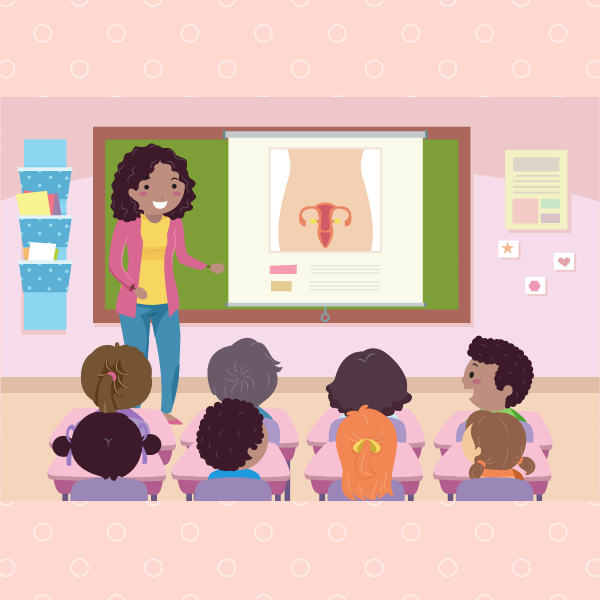A billion years ago (8 years? more?), I began to write my reported memoir on female sexuality and rape culture. At the time, the book focused on how I had become a sex writer in order to fix what I saw as my own brokenness and sexual dysfunction.
A few years after that, however, I became pregnant with my daughter. Suddenly, I was no longer writing about this private pain of mine. This one terrible experience. Instead, I was writing for my daughter. I was writing to fix her future.
A month before I learned I was pregnant, I also landed a job with AASECT (the American Association of Sexuality Educators, Counselors, and Therapists). During my time with them, I learned a lot about the state of sex ed in the United States, and I learned that whatever instruction my daughter received in school would likely not be enough to prepare her for a world in which women’s sexuality and women’s bodies were not seen as truly their own.
The focus of my work shifted further.
Our Patchwork System of Sex Ed
The most basic thing I’ve learned about sex ed in the U.S. is that no one’s sex education looks exactly the same. For one, each state has its own laws mandating what public schools can and cannot teach about sexuality.
Beyond these mandates, each school district is then responsible for choosing which curriculum they adopt (or, in some cases, whether they want to offer sex ed at all). So, basically, the sex ed my daughter receives could look very different from the sex ed someone just one town over receives.
Why Does Comprehensive, Inclusive, Medically Accurate Sex Ed Matter?
Learning about the fractured state of sex ed in our country made me feel powerless and it made me feel frustrated. Because as I delved deeper, I came to believe that sex ed (and early childhood sex ed in particular) was key to disrupting a system in which sexual violence ran rampant.
After all, according to research, learning about the body helps kids develop a certain level of comfort in talking about their genitals, making them more likely to disclose if anything inappropriate ever takes place. Later on, as they hit puberty and become teenagers, positive conversations around sexuality have been shown to lead to the delayed onset of sexual activity, greater condom use, and a reduction in various forms of sexual risk-taking.
Meanwhile, a lack of inclusive sex ed leaves many marginalized populations behind. Non-inclusive programs tend to uphold traditional gender norms, which can hurt those who are not themselves white, cisgender, or heteronormative. These kids can, as a result, experience shame over who they are simply because they don’t see their identity and their experiences being reflected in the curriculum.
Students need to be able to see themselves in what we teach. Otherwise, they’re unconsciously taking on the belief that the information they’re receiving is not relevant to them.
What Can We Do?
As I’ve grappled with the inadequacy of sex ed in the United States, I’ve flailed about a bit, trying to find some semblance of control. And I’ve been able to do that, to some extent, by becoming a sex-positive, askable parent (and, in fact, I’m now offering a one-hour workshop on sex-positive parenting).
But when children don’t see the lessons they learn at home reflected in the lessons they learn at school, it can sometimes cause a disconnect. Which is why it’s also important to learn about what the sex ed policies are in your state and in your district and to then advocate for better sex ed.
What can you do?
Do Your Homework. Look up the state mandates around sex ed, and then contact your local school board to learn more about their policies, and about which curriculum they’re using. Learn more about what is (and isn’t) included in the curriculum, and who provides it.
Find Your People. If you’re not happy with what’s on offer, seek out and connect with other parents and local groups who feel the same. Strength in numbers!
Get Involved. Attend your local school board meetings, get to know its members, and initiate conversations about sexuality education. Be prepared to talk about why comprehensive sexuality education is so important. Bring all the info you’ve dug up on the impact it can have. Gather a mix of statistics and personal stories. Startling statistics can catch someone’s attention, but stories are what really make people connect to an issue.
Contact Your Policymakers. Reach out to your state and federal representatives — whether by phone, email, or in person — about the importance of strengthening sex ed requirements.
SIECUS has an awesome Community Action Toolkit you can use if you’re serious about advocating for better sex ed.
And if you’d like to read more, I recommend When Sex Goes to School by Kristin Luker.
And if you’re looking for additional resources for the sex ed you provide at home, I’ve created a site for parents called Guerrilla Sex Ed. It contains at-a-glance info on state-by-state legislation around sex ed, and also provides lists of books, websites, advocacy organizations, and more.


Pingback: Holiday Gifts for the Blossoming Young Feminist in Your Life
Pingback: Women's Sexuality Has Always Been Controlled By Others | Feminist Book Club
Pingback: When It Comes to Birth Control Access, We Can Finally Stop Playing Defense | Feminist Book Club
Pingback: Disabled Youth Aren't Receiving the Sex Ed They Deserve
Pingback: Unpaid Family Caregivers Have Had a Heckuva Year
Pingback: Pussypedia: The Book About Bodies I'll Share with My Daughter
Pingback: Sex-Positive Feminism is About More Than Getting Off | FBC